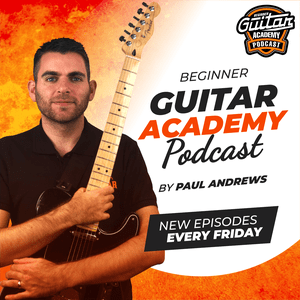In this insightful episode, Paul Andrews tackles a question every guitar beginner faces: What’s truly the hardest part about practicing guitar? Drawing on real experiences shared by the Beginner Guitar Academy community, he explores the genuine challenges students face—such as staying motivated, finding time, battling fatigue, maintaining consistency, and not knowing what or how to practice.
Rather than just offering textbook advice, Paul Andrews reflects on honest stories from adult learners juggling work, family, and health, reminding us that it's rarely a technical issue that causes beginners to quit—it's learning how to make practice fit into real life.
What’s Inside This Episode
Community Feedback Spotlight:
Paul Andrews shares responses from Beginner Guitar Academy members, highlighting the diversity of challenges faced by beginners.
Monthly Academy News: Updates on the latest Academy Show, shoutouts for progress checks, and news about the newly re-recorded “Wonderful Tonight” tutorial with improved practice/play-along tracks.
Biggest Practice Hurdles Discussed:
Getting Started: Strategies to eliminate friction and excuses, including the powerful 2-minute rule and simple mindset shifts to make practice part of your daily routine.
Consistency and Streaks: Insights on practice streaks, using a practice log, and tips for bouncing back if you miss a day.
Grinding Through Exercises: Advice on making repetitive practice interesting—set specific goals, use timers, record your progress, and make exercises musical.
Lack of Time: The myth of not having time vs. lacking clarity. The Default 20-minute practice plan and ways to break larger practice blocks into manageable bits.
Forgetfulness: Keeping old skills fresh with smart rotation strategies and connecting theory to everyday playing.
Fatigue and Real-Life Interruptions: Matching practice intensity to energy levels, embracing small chunks, and allowing flexibility in your schedule.
Physical Limitations: How to keep progressing with ear training, sight reading, and mental practice if you can’t physically play.
The Importance of Fun: Remembering that guitar is meant to be enjoyable. Structure matters, but so does making space to simply play and experiment.
Practical Takeaways
Lower the Practice Bar: Even 2 focused minutes can build momentum.
Use Visual Reminders: Keep your guitar out and easy to grab.
Build Streaks, Not Perfection: Track your practice days and don’t worry about missing one—just don’t miss two in a row!
Structured Practice Plans: Use templates and Academy resources to avoid wondering what to work on.
Rotate and Refresh: Regularly revisit old skills to prevent forgetting and boost confidence.
Match Practice to Your Life: Adjust ambition based on energy—some days just play for joy.
Resources Mentioned
Academy Show: Member-only recap of monthly progress and new releases.
Practice Log: Download at bgapodcast.com/log to help build and maintain your streak.
Practice Plans & PDFs: Available in the Academy resources.
How to Practice Guitar Workshop: In-depth video in the workshop section of Beginner Guitar Academy.
Join the Community
If you’re struggling with practice, reach out! Paul Andrews is happy to answer questions via
[email protected].
Discover more at beginnerguitaracademy.com—sign up for a 2-week trial for only $1, with easy cancellation. Connect with learners worldwide and get the guidance and support you need to become a confident guitarist.
Final Thought:
No matter the obstacle—time, motivation, fatigue, or physical limitations—there is a way to make practice work for you. Structure, flexibility, and a dose of fun will make all the difference.
Tune in next week for another episode and keep practicing!


